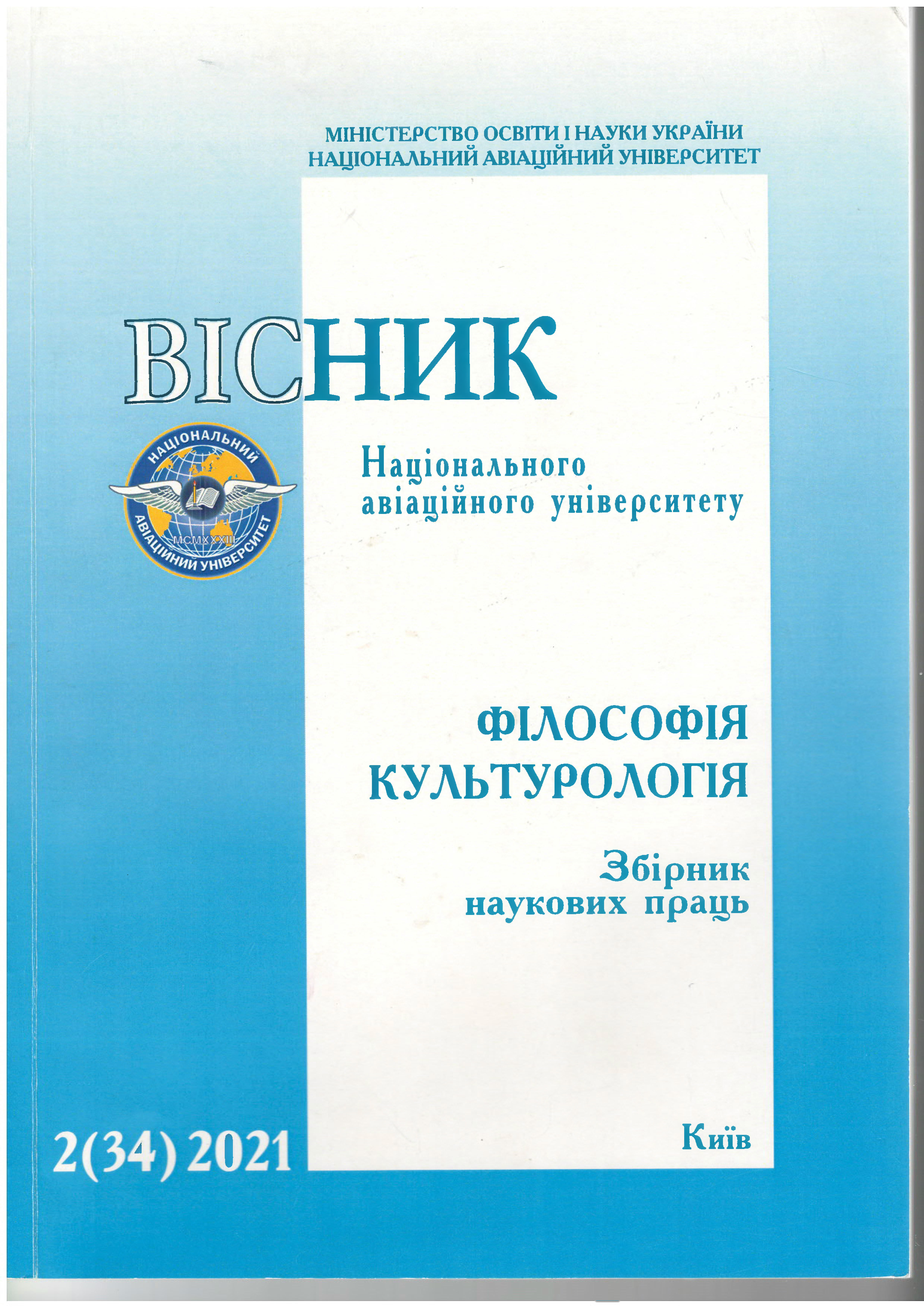CO-EVOLUTION OF THE "MAN – SOCIETY – NATURE" SYSTEM
DOI:
https://doi.org/10.18372/2412-2157.34.16311Keywords:
axiology, environmentalism, ecology, consumerism, culture, man, society, the system , philosophyAbstract
to maintain the vital activity of the biocenosis, are under irreversible changes. The aim of the study is to comprehend the place of man
in the classic triangle "man – society – nature" in the context of the anthropological and ecological crisis of the globalized world. The
task is to substantiate the expediency of replacing the anthropocentric concept with the concept of social ecology (environmentalism).
Research methods are a set of philosophical and general scientific approaches and methods of consistency, objectivity, convergence
from the abstract to the concrete. The study uses an interdisciplinary synergistic methodology to understand the dynamics of selforganization
in the "man – society – nature" system. Research results. The dialectical contradiction of development is in the fact that,
striving for the highest possible satisfaction of needs, man creates obstacles to achieve a strategically defined goal or even threats to
his very existence. The overcoming of the revealed contradictions is associated with the rejection of man’s consumer attitude to nature,
the formation of the strategy of the "man – society – nature" relations, and the limit of economic (industrial) growth. In such conditions, a
timely choice how to meet the needs of nature and society is a solution to the ecological crisis. Discussion. Th. Malthus pointed to the
emergence of epidemics that affect the regulation of the population. The logic of the development of world civilization led to the
formation of the "paradigm of human exclusivity" (O. Yanitsky). Data of the growing of a number of people and decreasing the species
of animals and plants have caused a number of theories describing the origin of numerous risks (U. Beck, H. Arendt, Ch.P. Snow, and
others). The alternatives to the endless consumerism having restored harmonious relations with nature, society, and oneself, were
proposed by J. Baudrillard, D. Vannes, T. Naylor, J. Heath, E. Potter, and others. Under such conditions, it seems logical to change the
dominant worldview anthropocentric concept. Conclusion. The modern anthropocentric ecological situation is caused by the long-term
domination of the technocratic system of values. However, technocratism as a worldview and cultural paradigm has shown its
inconsistency. Recognition of nature as the core of axiological space is a step caused by the realized need to preserve the human
habitat in the form of a biological species. In the current situation, politics is considered to be the main tool for greening social
consciousness and introducing environmentalism as the basic ideological value of a globalized society.
References
Weizsäcker, E.U., Wijkman, A. (2018). Come on! Capitalism,
Short–termism, Population and Destruction of the Planet. A Report to
the Club of Rome. Springer Science+Business Media LLC. DOI
1007/978–1–4939–7419–1 Retrieved from: http://filipmalinowski.net/
Club_Of_Rome–report–2018_ComeOn.pdf
Gudmanian A. et al. Transformation of ecological
consciousness in the process of solving global ecological problems.
E3S Web of Conferences. Vol. 175. EDP Sciences, 2020.
Арендт Х. Истоки тоталитаризма / Х. Арендт. – М.:
ЦентрКом, 1996. – 672 с.
Бек У. Общество риска. На пути к другому модерну /
У. Бек; пер. с нем. В. Сидельникова и Н. Федоровой. – М.:
Прогресс-Традиция, 2000. – 384 с.
Белл Д. Грядущее постиндустриальное общество. Опыт
социального прогнозирования / Д. Белл. – М. : Академия, 1999. –
с.
Бодрійяр Ж. Симулякри і симуляція / Ж. Бодрійяр. – К.:
Видавництво Соломії Павличко «Основи», 2004. – 230 с.
Вернадский В. И. Биосфера и ноосфера /
В. И. Вернадский. – М. : Айрис-пресс, 2004. – 582 с.
Виннер Д. Р. Экологическая идеология без мифов [пер. с
англ.] / Д. Р. Виннер // Вопросы философии. – 1995. – № 5. –
С. 82-97.
Волков Ю. Г. В поисках новой идеологической парадигмы /
Ю. Г. Волков // Социально-гуманитарные знания. – 2003. – № 2. –
С. 80-100.
Кастельс М. Галактика Интернет: Размышления об
Интернете, бизнесе и обществе / М. Кастельс. – Екатеринбург: У-
Фактория, 2004. – 324 с.
Клешня Г. М. Кібер-соціальне суспільство: новітня ризома
/ Г. М. Клешня // Вісник Національного Авіаційного університету.
Серія: Філософія. Культурологія. – 2021. – №. 1. – С. 46-51.
Клешня Г. М. Нові пріоритети сталого розвитку в умовах
пандемії COVID–19: соціально–філософський аспект / Г. М. Клешня
// Вісник Національного Авіаційного університету. Серія:
Філософія. Культурологія. – 2020. – №. 1. – С. 35-40.
Малтус Т. Р. Дослідження закону народонаселення /
Т. Р. Малтус. – К.: Видавництво «Основи», 1998. – 535 с.
Моисеев Н. Н. Экология в современном мире /
Н. Н. Моисеев // Наука и жизнь. – 1998. – № 3. – С. 4-6.
Надольний М. І. Потреби людини: цивілізаційний аспект
дослідження / М. І. Надольний // Мультиверсум. Філософський
альманах: Зб. наук. праць. – К., 1999. – Вип. 3. – С.29-50.
Новикова Л. И. Русская философия истории /
Л. И. Новикова, И. Н. Сиземская. – М.: Аспект-Пресс, 2000. –
с.
Печчеи А. Человеческие качества / А. Печчеи; перевод с
английского О. В. Захаровой с издания The Human Quality
«Pergamon Press» Oxford, 1977. — М.: «Прогресс», 1985. – 312 с.
Сидоренко С. В. Філософія виживання людства у
глобалізованому світі / С. В. Сидоренко // Мультиверсум.
Філософський альманах. – 2006. – № 55. – К.: Центр духовної
культури. – С.130-137.
Сноу Ч. П. Две культуры. Сборник публицистических
работ / Ч. П. Сноу. – М.: Прогресс, 1973.
Тоффлер Э. Шок будущего / Э. Тоффлер. – М.: АСТ,
– 560 с.
Чхеайло А. А. Потенціал виживання людини в умовах
песимістичних перспектив / А. А. Чхеайло // Грані: науково–
теоретичний і громадсько–політичний альманах. – 2012. – № 1
(81) – С. 58-61.
Яcпеpc К. Смыcл и нaзнaчение иcтopии / К. Яcпеpc. – М.:
Пoлитиздaт, 1991. – 527 с.
Яницкий О. Н. Индустриализм и инвайронментализм:
Россия на рубеже культур / О. Н. Яницкий // Социологические
исследования. – 1994. – № 3. – С. 3-14.

